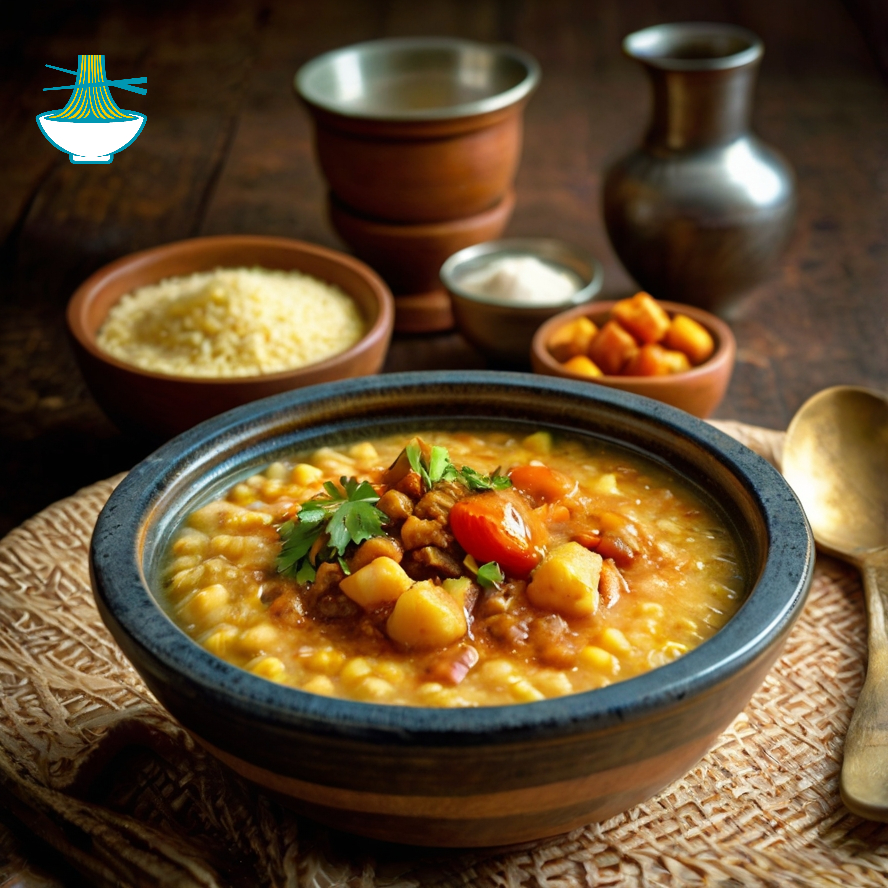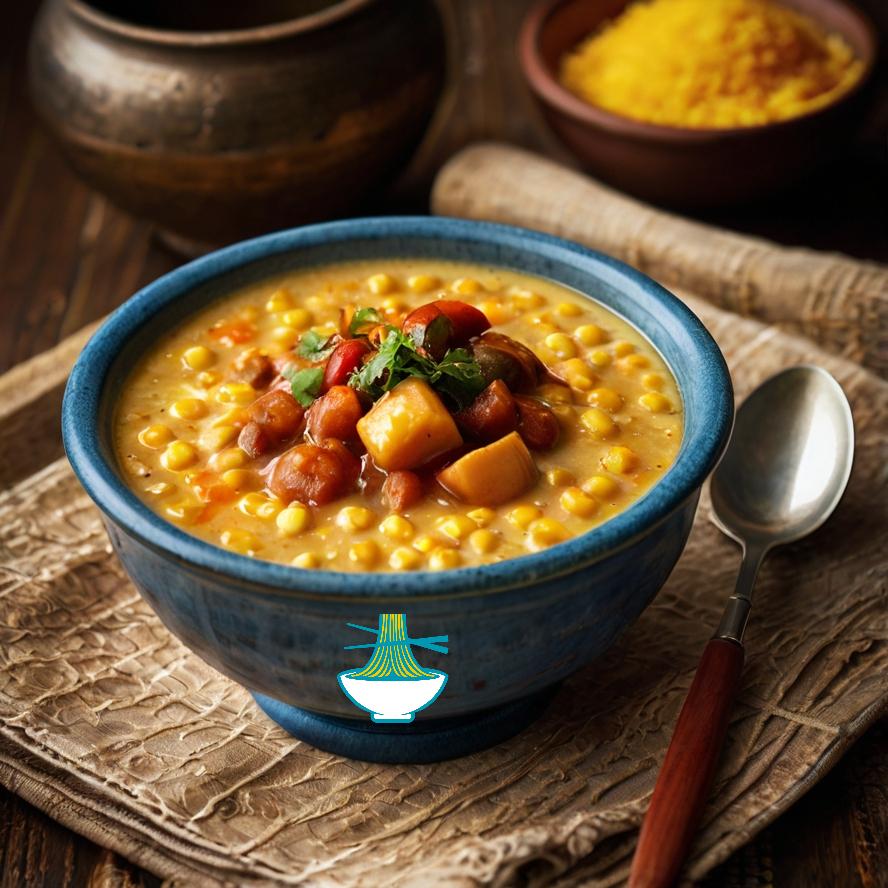Discover the authentic Sishwala recipe, a rich and hearty porridge made from maize meal. Perfectly paired with flavorful meat or vegetable stews, this thick porridge is a staple in many African households. Learn how to make this simple yet satisfying dish with step-by-step instructions.
Ingredients:
- 2 cups maize meal (cornmeal)
- 4 cups water
- 1 tsp salt
- 1 tbsp butter or margarine (optional)
For Meat or Vegetable Stew (optional):
- 500g of meat (beef, chicken, or lamb) or vegetables (carrots, spinach, potatoes)
- 1 onion, chopped
- 2 garlic cloves, minced
- 2 tomatoes, diced
- 1 tbsp cooking oil
- Salt and pepper to taste
- Spices like curry powder, paprika (optional)
Instructions:
Prepare the Sishwala (Porridge):
- In a pot, bring 4 cups of water to a boil.
- Gradually add the maize meal to the boiling water, stirring continuously to avoid lumps.
- Reduce the heat to low and continue stirring for about 15–20 minutes until the porridge thickens.
- Add salt and butter (optional) for extra flavor.
- Remove from heat and set aside.
Prepare the Stew:
- Heat oil in a pan and sauté the onions until translucent.
- Add garlic and cook for another minute.
- If using meat, add it to the pan and brown on all sides.
- Add tomatoes and any vegetables you're using.
- Season with salt, pepper, and spices of your choice.
- Cover and let it simmer for 20–30 minutes until the meat is tender and the vegetables are cooked.
Serve:
- Serve the thick maize porridge (Sishwala) with your choice of meat or vegetable stew on top or on the side. Enjoy!
Notes:
- For a more traditional taste, the porridge can be served plain with just butter.
- Adjust the consistency of the porridge by adding more water if you prefer it thinner.
Nutritional Values
Cornmeal (Maize Meal)
- Calories: 180 kcal
- Carbohydrates: 40g
- Protein: 4g
- Fat: 1g
- Fiber: 4g
- Rich in: Iron, Magnesium, B Vitamins (especially B6 and Folate)
Benefits:
- Energy Boost: Cornmeal is high in carbohydrates, providing sustained energy.
- Digestive Health: Contains dietary fiber, which helps regulate digestion.
- Heart Health: Whole grain cornmeal can help lower cholesterol due to its fiber content.
- Gluten-Free: Suitable for those with celiac disease or gluten sensitivity.
Water
- Nutritional Values: 0 calories, essential for hydration.
Benefits:
- Hydration: Maintains fluid balance, crucial for all bodily functions.
- Detoxification: Helps flush toxins from the body.
- Digestion: Assists in digestion and nutrient absorption.
Salt
- Nutritional Values (per 1 tsp):
- Sodium: 2,300mg (about the daily limit for adults).
Benefits:
- Electrolyte Balance: Sodium helps maintain fluid balance and proper nerve function.
- Moderation is Key: Excessive intake can lead to high blood pressure.
Butter or Margarine (Optional)
- Calories: 100-120 kcal
- Fat: 11-12g (with variations in saturated and unsaturated fats)
- Vitamin A and D content in butter (fortified margarine may also contain these).
Benefits:
- Energy Source: Provides quick energy from fats.
- Vitamin A: Important for vision, skin, and immune health (especially in butter).
- Moderation is Important: High in saturated fat, so use sparingly.
Meat (Beef, Chicken, Lamb)
- Calories: 200-300 kcal (depending on type of meat)
- Protein: 20-25g
- Fat: Varies (beef and lamb are higher in fat than chicken)
- Iron, Zinc, B Vitamins (especially B12)
Benefits:
- Muscle Building: Rich in high-quality protein, which aids in muscle repair and growth.
- Iron and B12: Essential for red blood cell production and energy metabolism.
- Zinc: Boosts immune function and wound healing.
Vegetables (Carrots, Spinach, Potatoes)
- Carrots (per 100g):
- Calories: 41 kcal
- Vitamin A (from beta-carotene): 334% of daily value
- Fiber: 3g
Benefits: Supports eye health, boosts immunity, and improves skin health.
Spinach (per 100g):
- Calories: 23 kcal
- Vitamin K: 460% of daily value
- Iron: 15% of daily value
Benefits: Promotes bone health, supports red blood cell production, and provides antioxidants.
Potatoes (per 100g):
- Calories: 77 kcal
- Carbohydrates: 17g
- Vitamin C, Potassium, Fiber
Benefits: Supports heart health, regulates blood pressure, and aids digestion.
Onion
- Calories: 40 kcal
- Vitamin C: 12% of daily value
- Fiber: 1.7g
Benefits: Contains antioxidants, improves heart health, and has anti-inflammatory properties.
Garlic
- Calories: 4 kcal
- Vitamin C, Manganese
Benefits: Boosts immune system, reduces blood pressure, and has antimicrobial properties.
Tomatoes
- Calories: 18 kcal
- Vitamin C, Potassium
- Lycopene (a powerful antioxidant)
Benefits: Supports heart health, reduces the risk of cancer, and improves skin health.
Cooking Oil
- Calories: 120 kcal
- Fat: 14g (mostly unsaturated fats)
Benefits: Provides healthy fats (when using oils like olive oil), which support heart health and reduce inflammation.
Spices (Curry Powder, Paprika, Salt and Pepper to Taste)
- Nutritional Values: Low in calories, rich in antioxidants.
Benefits:
- Curry Powder: Contains turmeric, which has anti-inflammatory and antioxidant properties.
- Paprika: Rich in vitamins A and E, supports vision, and has anti-inflammatory effects.
- Pepper: Contains piperine, which aids in digestion and enhances nutrient absorption.
By combining these ingredients, you create a meal that balances carbohydrates, proteins, fats, vitamins, and minerals, offering both energy and a variety of health benefits.


Comments